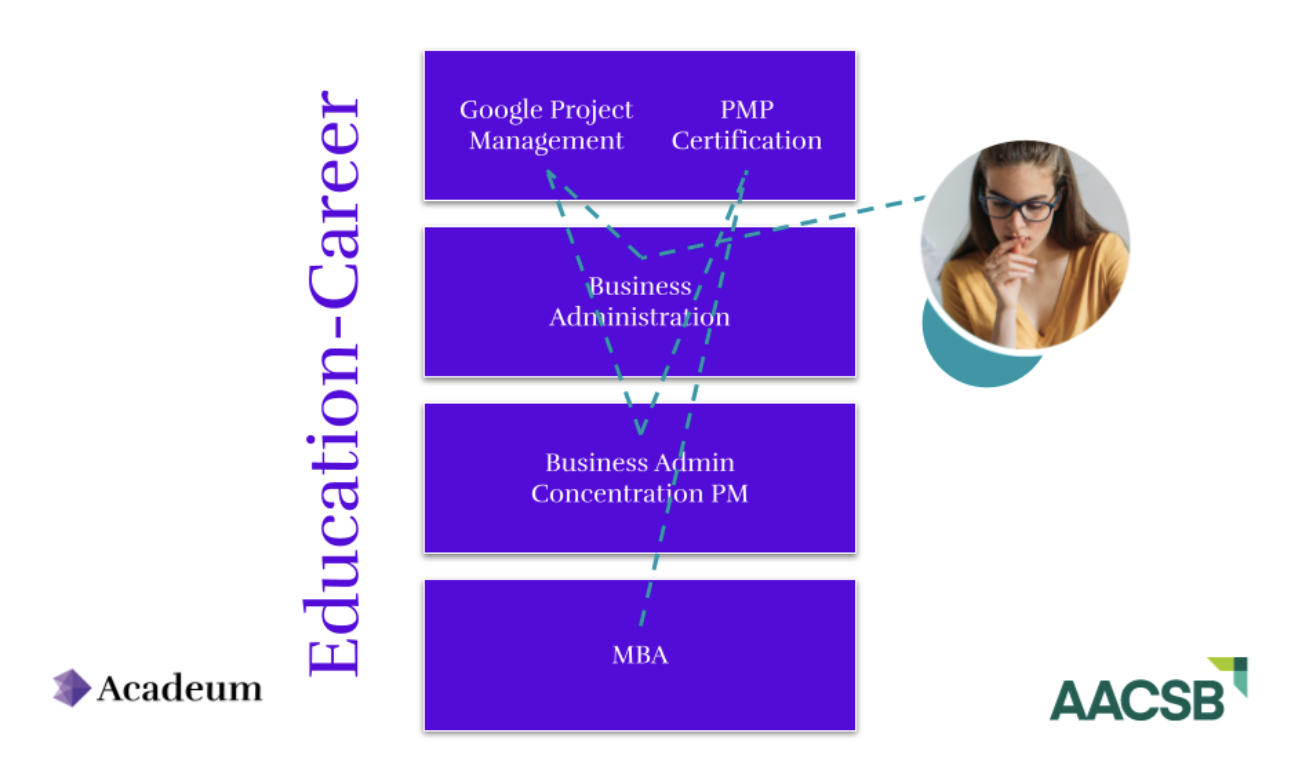Published by Acadeum
There is an emerging opportunity for institutions to consider expanding academic pathways by creating workforce-aligned programs that incorporate professional certifications. This is particularly prevalent in business pathways. In the spring of 2022, a Fortune Education article recognized the increase in demand for online business programs and noted, “The number of accredited U.S. schools with fully online MBA programs increased from 284 to 526 between the 2016–17 and 2020–21 academic years, according to data from the Association to Advance Collegiate Schools of Business. That’s an 85% increase.”
Colleges and universities should be at the center of this shifting landscape, and they are being challenged to find solutions that reconcile the expectations towards lifelong learning and provide the required skills desired by employers. Innovative responses will ensure that students not only earn degrees but also possess demonstrable skills and even certifications to enter and advance in the workforce.
The Power of a Network: Enabling Institutions to Do Together What’s Challenging to Do Alone
Creating business courses that maintain relevant and industry-aligned content can be costly and laborious. How can academic institutions keep up with the pace of change? Colleges and universities are finding success by leveraging like-minded institutions through the Acadeum network.
Acadeum connects accredited institutions and programs to share courses taught by qualified faculty. Currently, the network offers access to more than 4,000 business-related courses, including specialized courses and electives for emerging and in-demand fields. The most common and available courses are in accounting, management, marketing, and finance.
However, courses can be found in the network at various academic levels that cover administration, leadership, HR, supply chain management, change management, sports management, and analytics, to name a few. Additionally, the network includes access to professional certificates and microcredentials that can be incorporated into business pathways, as well as embedded into courses and programs to give your programs an edge in the market.
Read on to learn how partnering with the Acadeum network helps keep programs and pathways relevant by leveraging professional certifications and credentials to meet workforce needs.
Incorporating Professional Certifications and Microcredentials
Many students seek hands-on experiences and professional certifications on their academic journey. As educational leaders know, pathways for learners are no longer linear, and providers are filling gaps with short-term, low-cost alternatives that have only made the education-career continuum more complex and confusing for learners to navigate.
Higher education institutions are trusted sources that can play a vital role in translating these various learning milestones into a pathway that helps learners understand how they fit, achieve credit with microcredentials, and stack them into degrees that help them clearly advance over the course of a career.
Pathways should make clear the various courses, certifications, exam prep, and industry-aligned learning that can stack into degrees to support traditional and nontraditional students. In an academic pathway for business, a student might start their business administration associates degree, which awards credit for the Google Project Management professional certificate as part of the degree program.
Because of this industry-aligned experience, the learner can secure an entry-level job and decides to continue in an online bachelor’s business administration program with a specialization in project management that will prepare her for the PMP exam and certification.
After achieving a promotion at work by advancing through these educational milestones, her employer is willing to help fund her pursuit of an MBA. This example demonstrates several opportunities to capture learners who return to an institution to stay certified for skills-based knowledge.
Institutions can use these professional certifications not only as a stand-alone entry or reentry point for learners, especially when willing to acknowledge them for credit towards degrees, but also to help deliver workforce-aligned content directly within an institution’s programs.
Microcredentials aligned with industry requirements that are incorporated into these certificate and degree programs help students progress along their education continuum while earning credentials with labor market value. Professional certificates ensure students graduate with industry-relevant content and skills. When students select an institution, they often consider their employability post-graduation.
McKinsey and Company and others have noted the digital transformation has shifted the skills employers are looking for when hiring. Professional certificates increasingly provide employers with an indicator of acquired skills required for a particular job or career. By aligning these certifications with the learning outcomes in a discipline pathway, academic institutions ensure they equip graduates with the skills and knowledge needed to succeed in their chosen careers.
Bay Path University’s Megan Piccus, senior director of business and leadership programs, mapped the Google Data Analytics Professional Certificate into the institution’s business pathway. Students earn nine of their required credits for the Business Analytics major by completing this industry-aligned content.
Southeastern University’s Jeff Paul, dean of Jannetides College of Business, responded to marketplace demands and utilized their geographical location in Central Florida to equip students to enter the popular Florida tourism industry. Southeastern University (SEU) offers a Hospitality and Tourism Path with customizable assignment options. In addition, SEU also provides certifications in marketing and leadership for the Business Communication Leadership pathway and a certificate in digital media and design for Communication and Mass Media.
The Community College of Baltimore County often sees nontraditional students returning to college for a career change. The business school encounters many students who decide they want to become CPAs. As a result, the business school schedules courses beyond the traditional semester. As an example, Accounting Professor Melissa Stitt points to the department offering Accounting I and II back-to-back sequencing to meet student needs. The courses move into accounting degrees, and the flexibility and transparency help students find and complete courses when needed.
Creating Impact with the Acadeum Advantage
Partnerships with the Acadeum network offer institutions critical advantages for creating and supplementing business programs and also incorporating professional certificates into a pathway that will serve learners at all stages.
Acadeum is a strategic business partner with Coursera and works 1:1 with institutions to build out industry-aligned pathways. Institutions are able to immediately access courses within the Acadeum Course Share platform that incorporate these industry certificates and immediately start using them in their programs. This is one of the many distinct advantages of doing program share within the Acadeum network.
Personalization: At Acadeum, we’re not creating a one-size-fits-all curriculum. Instead, your institution decides what is the best fit for your program. You determine the courses to staff and those to offer in partnership with a variety of Teaching Institutions in our network, particularly those that are already incorporating professional certificates directly into their offerings.
Flexibility: The Acadeum network responds to the needs of each institution. We offer sustainable options for challenges in higher education. Use the courses when needed as you build enrollment or while you are waiting to develop a particular size cohort. We can offer flexibility because of the breadth of what we bring together as the largest consortium and course sharing network in higher education.
Partnership: We help create the right program for your institution. Your dedicated Acadeum Partner Success Manager guides you as your institution answers the questions and considers the factors in developing business pathways.
That partnership could facilitate a major, start a minor, concentration, certificate program, or even delve into graduate programs. There is also an opportunity to build agreements between institutions, so the network offers dependability and security that dedicated sections are there when you need them.
There is an increasing need for institutions to expand academic capacity by creating workforce-aligned pathways, including professional certificates, to keep business programs relevant. Acadeum expands what your institution can deliver by providing the infrastructure and the network to bolster student and institutional success.
Additional Resources:
https://www.edsurge.com/news/2022-05-04-colleges-are-losing-students-is-that-a-growth-opportunity-for-coursera
https://slejournal.springeropen.com/articles/10.1186/s40561-022-00190-1 (A strategic reset: micro-credentials for higher education leaders) – Article published in 2022 in Smart Learning Environment by McGreal & Olcott:
Learners want more options at lower costs to support their education and training for jobs. Employers want entry-level employees with better skills and the capacity to learn, which in turn can give the company a competitive advantage in the marketplace. Finally, educational providers want to expand recruitment avenues to contribute to the modern workforce and remain competitive. The lesson for smart leaders is to integrate micro-credential initiatives with current institutional programs, make them easy to use with clear validation metrics, and, in this way, make micro-credentials a value-added benefit for all stakeholders.
https://universitybusiness.com/why-higher-ed-needs-to-get-on-board-with-micro-credentials/?oly_enc_id=5790E2394367H6Z (available in resource links)
In a recent study conducted by UPCEA & Colleges, it was even suggested that integrating industry/work-force aligned credentials may help bolster a student’s sense of purpose –
As students struggle with staying engaged in classes and feeling disconnected from the real world, the majority of employers agreed microcredentials greatest benefit is that they give people practical, real-world experience. Schools can motivate students by exposing them to opportunities built with direct input from the industries they aspire to join after graduating.
The study also confirmed that:
A resume containing microcredentials is increasingly advantageous. 95% of employers said a resume listing microcredentials benefited the candidate because it demonstrates a willingness for skill development.
Want to learn more about course sharing?
Download the Academic Leaders’ guide to course sharing.




